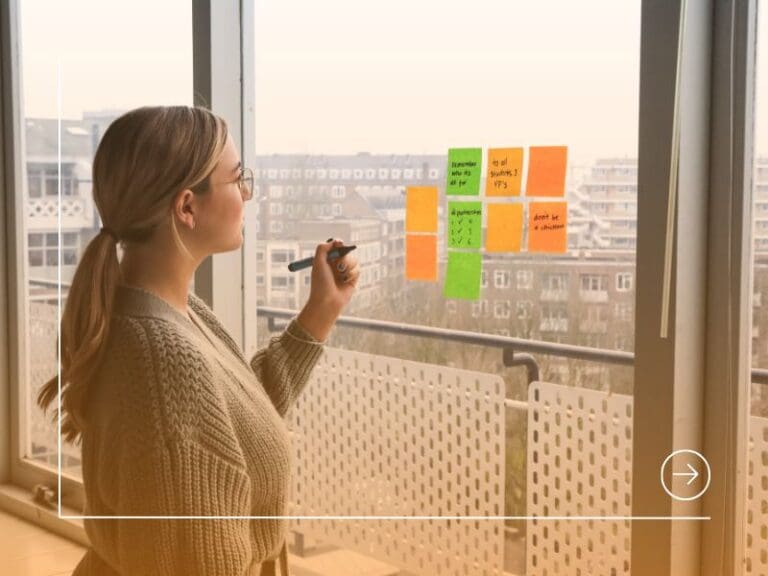Tell us about your current Senior Engineering role at Checkout and your journey to get there?
I am a Senior Engineering Manager in Checkout. I actually joined the company as a senior software engineer. After just over a year, I transitioned to Engineering Lead – a role which is still hands-on but also mentors others. I also had direct reports and have become a technical leader of various projects.
Roughly around the same time as I got promoted, I also had a baby. So I was away for about half a year. And even though it was just half a year, the company is growing very quickly and things are changing rapidly, so when I returned, I really needed to learn a lot from the beginning of those company changes.
A lot of technical initiatives also launched while I was away. So I had to come back into a new role and to a new reality in the company. It was an equally challenging and interesting time for me. A year later, Checkout also started to change the role of the Engineering Lead. We are now more focused on supporting the delivery of projects, by mentoring and supporting the team, but being less hands-on ourselves.
As I have 14 reports, I’m more focused on managing the delivery part and less on the direct, hands-on work.
So do you still get the chance to get involved in hands-on coding?
In the actual development? Not so much. I still sometimes review code, but my focus is on working hard to develop the next generation of leaders. And so, they’re the ones responsible for hands-on coding, to maintain a high level of quality, and also to support people in their coding. And I really trust them.
As someone who manages 14 people as part of your team, how do you get the best out of your people?
Well, at Checkout we have formal review periods twice a year, but it’s actually something we need to do all the time. As a manager, you need to always be focused on your team’s development. The team is made up of software engineers at different levels – junior, mid-level and even senior engineers with their own direct reports.
We also have software developers that are responsible for test automation as well as a support team. Everybody on the team needs a different approach, different support, different mentoring.
And it’s not just about the different roles on your team. You also need to know your people individually and be familiar with them to have one-on-one conversations with them to understand their aspirations, and what they want from their career. It’s about what they want to do and how they want to develop. But you need to align this with what the team and what the company needs, what our role is as a team, and as a company as well.

In Checkout, we have a development framework for this and a framework for each role, so that significantly helps. These include expected proficiencies – things that you can practically work on. It also really helps to set goals and for the engineers themselves to know what is expected from them – with directions they can take for development.
As you’re now quite hands-off when it comes to coding, how do you ensure that you keep up to date?
Technologies are constantly evolving, so you just have to keep learning. Otherwise, you fall behind on current trends and future developments; the knowledge of which are just as essential in a leadership role. So you have to remain proactive.
Since my team members are more hands on, they often hold knowledge sharing sessions. I really learn a lot from my own team. Someone in the team might present, for example, a new approach in .NET around minimal APIs. I didn’t know much about it before. But then it gave me an idea that we could make a new template – a proof of concept around it for one of our products.
So even if I’m not so hands-on, I’m still learning from the team and then I use their knowledge to bring them ideas based on that knowledge. In summary, it’s a knowledge exchange.
What’s one of the more challenging parts of your role?
Currently, one of my biggest challenges is around integrating APMs – alternative payment methods.
What many people maybe don’t know is that many countries, in fact almost every country, have multiple local alternative payment methods. And they all need to be integrated individually. Therefore, you need to know their points of contact, their technical API, their solution architects. It’s all very interesting, but also a big challenge – working with so many people, with different locations, different time zones, different styles, different approaches to work, and obviously different approaches of the technical API.
This is extremely interesting. Since I started working at Checkout, I have worked with so many different partners, and I don’t think I would, in any other role, have had a chance to communicate with so many people.
Another challenging element – on the one hand, it might seem that all the alternative payment methods are the same, but they are actually far from being the same: technically, and from the product perspective and how the money flows – there are many differences. At Checkout, we obviously want to integrate many of them for our merchants who are integrating fast checkouts, but you really do need to be familiar with details when you work with each individual alternative payment method.
So you’re a founding member of our Culture Champion Network at Checkout. What initiatives have you been involved in and what impact have you seen them have in the business?
This network started more than three years ago and I was one of the first to join, when it started. It was also set up before the COVID pandemic hit, so back then it was often around events, get-togethers and volunteering. Many of our initiatives were about getting the team together, spending time together, meeting outside of the office and getting people to know each other.
Volunteering was also a big part of the network. We participated in charity runs and we also did park-cleaning projects. So when the pandemic hit, we could no longer do these in-person events. It became much more about the culture of the team and what direction we should go.
We also introduced an employee engagement survey to work on our culture and as well our Culture Champions, we have a Mental Health Champions network.

We send everybody who joins this network to several training days, like mental health training, how to support employees, etc. All of this became especially significant during the Coronavirus pandemic, because people worked from home and many people needed help and support. So now people know who they can contact when it comes to mental health matters. As part of these networks, we are also responsible for promoting these topics about culture and mental health.
How important do you think it is to have intersectional diversity within the team of engineers that you’re building?
I believe it’s very important because often you can interview at a company and you notice that the interview process is designed around a certain profile and they’re looking for a certain style of communication.
And sometimes people come for interview who are perhaps more introverted, with less confidence and don’t talk loudly or assertively. But when they start working, you see that their performance is just amazing. And they’re great team members and mentor others. Sometimes we judge people unfairly based on a certain kind of scale or certain profile.
For me, diversity is also important because even if someone is not scoring the best on the interview or the set of questions we created a year ago, when we designed the interview, they may bring other values to the team.
What advice do you have for the next generation of women in tech who want a successful career like yours?
I think the main thing that I would advise is to actively learn and never stop learning. It obviously starts when you learn at school and university – there you should go and learn the topics that you want and that you enjoy. Do not care about labels. Very often it’s said that tech and science are not for women and girls.
I really liked maths as a small girl. I learned to program at home. I really liked it and I didn’t really care what people thought or said about it. So never stop learning.
Now I’m working in tech. You might say, ‘but you have a Bachelor’s degree and a Master’s degree. You have x years of experience, why do you need to continue learning?’ But you always need to work and learn. There’s always something to learn, especially now, even if it’s less on the tech side and more around leadership and mentorship. I also learn a lot from my own managers. It’s important to have a good relationship with them; that really helps you learn a lot from them and their experience.
Finally: really be proactive. Don’t allow yourself to think that someone is going to come and tell you ‘here’s the opportunity for you.’ That’s not going to happen. Sometimes society says that maybe we women should not be proactive and yes, maybe we are being judged when we are being proactive, because then we’re often being perceived as aggressive. But your destiny is in your hands. And if you keep learning and being proactive, if you promote yourself, if you have good relationships with your peers and managers, you have everything you need to be successful in the end.








